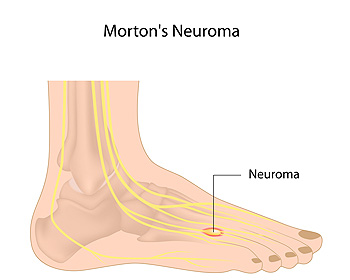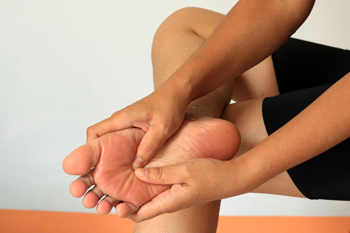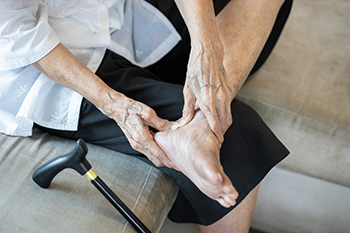

Pain in the ball of the foot, sometimes described as having a stone in the bottom of the shoe, is generally a symptom of Morton’s neuroma. This benign condition is the result of extra nerve tissue growing between the third and fourth toes of the foot. Simply putting weight on the foot when standing or walking can set off the nerve pain from Morton’s neuroma. Among the contributing factors leading to Morton’s neuroma are wearing high-heeled shoes with narrow toe boxes and playing sports for extended periods. Not surprisingly, cases of Morton’s neuroma are more likely to be found in women between 40 and 70 years old. On the other hand, most men with this condition are under 30 years old. Symptoms include pain in the ball of the foot, a burning and tingling pain in the nearby toes, and feeling like a sock is bunched up inside the shoe. Changes to footwear and massaging the affected area can help to alleviate the pain. In more severe cases, a surgical solution may be necessary. If you believe you have Morton’s neuroma, it is suggested that you consult a podiatrist for an exam and diagnosis before deciding on treatment options.
Morton’s neuroma is a very uncomfortable condition to live with. If you think you have Morton’s neuroma, contact the podiatrists of The Foot & Ankle Center of New Jersey. Our doctors will attend to all of your foot care needs and answer any of your related questions.
Morton’s Neuroma
Morton's neuroma is a painful foot condition that commonly affects the areas between the second and third or third and fourth toe, although other areas of the foot are also susceptible. Morton’s neuroma is caused by an inflamed nerve in the foot that is being squeezed and aggravated by surrounding bones.
What Increases the Chances of Having Morton’s Neuroma?
Morton’s neuroma is a very treatable condition. Orthotics and shoe inserts can often be used to alleviate the pain on the forefront of the feet. In more severe cases, corticosteroids can also be prescribed. In order to figure out the best treatment for your neuroma, it’s recommended to seek the care of a podiatrist who can diagnose your condition and provide different treatment options.
If you have any questions, please feel free to contact our office located in Paramus, NJ . We offer the newest diagnostic and treatment technologies for all your foot care needs.

Many patients consider having foot surgery when non-invasive options for their particular ailment have not worked. People who have severe bunions may opt for surgery, which is successful in permanently removing the bunion and realigning the toes. Patients who have arthritis may be interested in learning about fusion surgery, which can be helpful in relieving ankle pain. Hammertoe is a foot condition that causes the toes to bend upwards at the middle joint, and it may be difficult to wear shoes. Surgery may be performed that can permanently straighten the toes and can be successful in relieving existing pain. A common foot surgery involves the plantar fascia, which may become torn or irritated for various reasons. The type of surgery is helpful in repairing the plantar fascia, which is the band of tissue that connects the heels to the toes. If you have any type of foot condition that may be improved with surgery, it is suggested that you confer with a podiatrist who can determine if this is the correct decision for you.
Foot surgery is sometimes necessary to treat a foot ailment. To learn more, contact the podiatrists of The Foot & Ankle Center of New Jersey. Our doctors will assist you with all of your foot and ankle needs.
When Is Surgery Necessary?
Foot and ankle surgery is generally reserved for cases in which less invasive, conservative procedures have failed to alleviate the problem. Some of the cases in which surgery may be necessary include:
What Types of Surgery Are There?
The type of surgery you receive will depend on the nature of the problem you have. Some of the possible surgeries include:
Benefits of Surgery
Although surgery is usually a last resort, it can provide more complete pain relief compared to non-surgical methods and may allow you to finally resume full activity.
Surgical techniques have also become increasingly sophisticated. Techniques like endoscopic surgery allow for smaller incisions and faster recovery times.
If you have any questions please feel free to contact our office located in Paramus, NJ . We offer the newest diagnostic and treatment technologies for all your foot and ankle needs.

It is easy to recognize the symptoms of peripheral neuropathy, a condition that results from damage to the nerves in the body’s extremities. Burning, stabbing, and sometimes tingling pain in the feet are common, along with numbness and weakness. This is the result of the brain sending incorrect messages to the feet and toes. Peripheral neuropathy can be caused by diabetes, as the result of prolonged high blood sugar levels. Other causes include side effects of certain medications, hereditary factors, and autoimmune or kidney disease. It can also be a side effect of an underlying condition, such as obesity, alcohol abuse, and high blood pressure. In addition, a deficiency of vitamin B12 has been linked to developing peripheral neuropathy. While this condition is rarely cured, it can be managed to help reduce the symptoms. For more information about peripheral neuropathy that affects the feet and toes, it is suggested that you consult a podiatrist.
Neuropathy
Neuropathy can be a potentially serious condition, especially if it is left undiagnosed. If you have any concerns that you may be experiencing nerve loss in your feet, consult with the podiatrists from The Foot & Ankle Center of New Jersey. Our doctors will assess your condition and provide you with quality foot and ankle treatment for neuropathy.
What Is Neuropathy?
Neuropathy is a condition that leads to damage to the nerves in the body. Peripheral neuropathy, or neuropathy that affects your peripheral nervous system, usually occurs in the feet. Neuropathy can be triggered by a number of different causes. Such causes include diabetes, infections, cancers, disorders, and toxic substances.
Symptoms of Neuropathy Include:
Those with diabetes are at serious risk due to being unable to feel an ulcer on their feet. Diabetics usually also suffer from poor blood circulation. This can lead to the wound not healing, infections occurring, and the limb may have to be amputated.
Treatment
To treat neuropathy in the foot, podiatrists will first diagnose the cause of the neuropathy. Figuring out the underlying cause of the neuropathy will allow the podiatrist to prescribe the best treatment, whether it be caused by diabetes, toxic substance exposure, infection, etc. If the nerve has not died, then it’s possible that sensation may be able to return to the foot.
Pain medication may be issued for pain. Electrical nerve stimulation can be used to stimulate nerves. If the neuropathy is caused from pressure on the nerves, then surgery may be necessary.
If you have any questions, please feel free to contact our office located in Paramus, NJ . We offer the newest diagnostic and treatment technologies for all your foot care needs.

One in three people, who are older experience some type of foot pain, stiffness, or aching feet. Some of these may simply be attributed to age and wear and tear. Another cause may be wearing ill-fitting shoes. Many older people wear shoes that are too narrow, too small, and have heels that are too high. Other changes to the feet, such as loss of padding, fallen arches, and joint stiffness contribute to foot pain in seniors. In addition, several underlying illnesses may be factors, including diabetes, arthritis, and neuropathy. Foot pain in seniors may also result from an injury, standing for long periods, walking on hard surfaces, and carrying extra weight. A podiatrist is a specially trained doctor who deals with problems of the ankles, toes, and feet. It is suggested that you consult a podiatrist who will evaluate the type and source of the foot pain and be able to direct you to a treatment plan that works for you.
Proper foot care is something many older adults forget to consider. If you have any concerns about your feet and ankles, contact the podiatrists from The Foot & Ankle Center of New Jersey. Our doctors can provide the care you need to keep you pain-free and on your feet.
The Elderly and Their Feet
As we age we start to notice many changes in our body, but the elder population may not notice them right away. Medical conditions may prevent the elderly to take notice of their foot health right away. Poor vision is a lead contributor to not taking action for the elderly.
Common Conditions
Susceptible Infections
Diabetes and poor circulation can cause general loss of sensitivity over the years, turning a simple cut into a serious issue.
If you have any questions please feel free to contact our office located in Paramus, NJ . We offer the newest diagnostic and treatment technologies for all your foot and ankle needs.